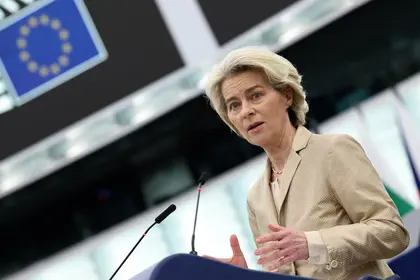EU chief Ursula von der Leyen on Wednesday said she was “confident” of getting Hungary to drop its veto on a 50-billion-euro ($54-billion) aid package for Ukraine at a crunch summit in two weeks.
Hungary’s right-wing Prime Minister Viktor Orban -- Russia’s closest EU ally -- refused in December to sign off on the assistance to prop up Kyiv’s state spending over the next four years.
JOIN US ON TELEGRAM
Follow our coverage of the war on the @Kyivpost_official.
The EU’s 27 leaders agreed to reconvene for a new meeting in Brussels on February 1 to try to hammer out a deal with Budapest on the aid and a broader update to the bloc’s budget.
“I am confident that a solution at 27 is possible,” von der Leyen, the head of the EU’s executive arm, told the European Parliament.
Budapest has signalled it could be in the mood to compromise and might agree to the aid if it is given the chance each year to veto further payments.
Other EU states have so far baulked at that demand, and officials in Brussels are frantically trying to pitch a solution.
EU officials say that if they cannot win over Hungary, the other 26 member states will look to provide cash directly, outside the EU’s budget, but this is likely to be for a shorter timeframe.
The EU says that billions of euros in budgetary support it has already given should tide Ukraine over for a few more months.
But Kyiv urgently needs a green light on the new funds as it seeks to keep government services running and pay salaries as Russia’s all-out war nears the two-year mark.

UN Condemns Russian Missile Attack on Odesa
The European Commission headed by von der Leyen has faced criticism for last month unlocking 10 billion euros in frozen EU funds for Hungary as it sought to win over Orban.
EU lawmakers at Wednesday’s debate urged von der Leyen not to cave into “blackmail” from Orban and are threatening a possible lawsuit against the commission over the release of the funds.
Von der Leyen defended the decision to release the 10 billion euros to Hungary, arguing that Budapest had passed a new law on judicial reform, something requested by Brussels, to get the funds.
“At the same time, around 20 billion euros remain frozen. They are suspended for reasons that include concerns on LGTBIQ rights, academic freedom and asylum rights,” she said.
She said that billions held up by Brussels “will remain blocked until Hungary fulfils all the necessary conditions.”
You can also highlight the text and press Ctrl + Enter










